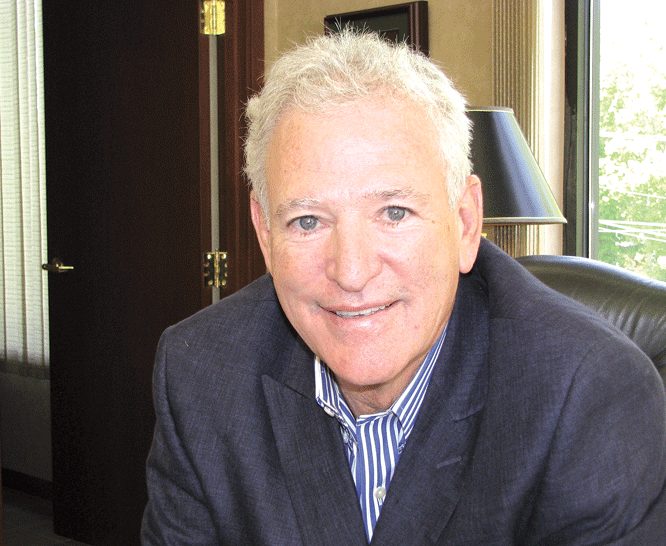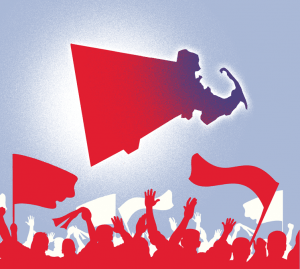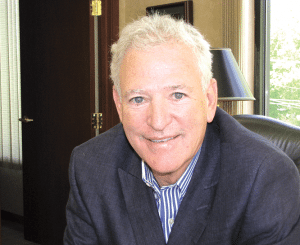
Elevating Their Game
Tourism Officials Ratchet Up Efforts to Draw Sporting Events
 John Heaps says the Greater Springfield region has done quite well when it comes to hosting sporting events in recent years — everything from the MAAC (Metro Atlantic Athletic Conference) basketball tournament in recent years to the 2004 U.S. Women’s Open golf championship, staged at the Orchards in South Hadley.
John Heaps says the Greater Springfield region has done quite well when it comes to hosting sporting events in recent years — everything from the MAAC (Metro Atlantic Athletic Conference) basketball tournament in recent years to the 2004 U.S. Women’s Open golf championship, staged at the Orchards in South Hadley.
And it’s done this without any real level of organization or a strategic plan for selling the area to those who stage such events, said Heaps, president and CEO of Florence Savings Bank, who told BusinessWest that he and others often wondered out loud what this region could accomplish in this realm if it put its collective mind to it.
And that’s probably the best way to sum up the creation of what’s called the Western MA Sports Commission, which Heaps now chairs.
It represents a concerted effort to research and then target sporting events that could take place across the four-county area, said Heaps, noting that this region is joining others across the country in recognizing the vast potential of sporting events to bolster an area’s tourism and hospitality sectors — and creating sports commissions to bring organization and sophistication to the assignment of attracting events.
John Heaps says the Western MA Sports Commission will work aggressively toward attracting events that are high-profile, high-impact, or, in the best-case scenario, both.
[/caption]“Communities large and small are coming to understand the scope of opportunities that sports represents,” he said, noting that even Chicago is making a more concerted effort to attract events through creation of a commission. “Sports can have a definite impact on our local economy, and we’re going to work aggressively to bring more events here.”
Mary Kay Wydra, exective director of the Greater Springfield Convention & Visitors Bureau, agreed. She told BusinessWest that the bureau, which was in what she called “survival mode” during and just after the Great Recession, when visitorship was down and the state was cutting back its contributions to such organizations, is now being much more aggressive in pursuit of conventions, meetings, and events — and sports can and should be a big part of that equation.
“When you look at how we can go about increasing tourism in our region and driving visitorship, sports is a niche we must explore,” she explained. “When we looked at what we can offer in terms of product, it seemed like a natural fit.”
Before elaborating on what the commission is all about, Heaps stated definitively what it isn’t about: simply bringing more basketball games and tournaments to the MassMutual Center in Springfield — although it may do that, too.
Instead, the commission will focus on the broad spectrum of youth, collegiate, amateur, and professional sports, and consider possibilities that range from rowing to ultimate Frisbee; from cycling and motocross to gymnastics; from badminton to Pop Warner football.
And as it does so, it will have several competitive advantages, said Steve McKelvey, associate professor and Graduate Program director of the Mark H. McCormack Department of Sport Management at UMass Amherst, and member of the commission. These include everything from affordability — Springfield and this region as a whole are considered a tertiary market, with hotel-room rates and other costs that are attractive to event planners on a budget — to the 17 colleges in the area and their collective sports facilities, to a line item that might simply be called ‘other things to do.’
“We have a lot of things that people can do while they’re here for a sporting event,” he noted, listing the basketball and volleyball halls of fame, area museums, Yankee Candle, and Six Flags New England, among many others. “We’re not in the middle of Oklahoma, where there’s nothing to do.”
Overall, those we spoke with said the Western Mass. region has vast potential as a host area for sporting events of varying sizes and shapes, but those tasked with putting more games and tournaments on the calendar will have to be selective with what they bring to the 413 area code, said Heaps, adding the phrases ‘high-profile’ and ‘high-impact’ to describe the types of events the commission will pursue.
For this issue and its focus on meetings and conventions, BusinessWest looks at the track soon to be laid by the sports commission, and how this group could significantly increase visitorship to the region through a host of games and tournaments.
Winning Attitude

John Heaps says the Western MA Sports Commission will work aggressively toward attracting events that are high-profile, high-impact, or, in the best-case scenario, both.
They include a framed photo of the 17th hole at the famed Pinehurst No. 2, which he aced during one of many visits to the North Carolina golf complex, this one for a convention of investment bankers. There are also several soccer balls given to him by his son, Jay, coach of the New England Revolution, and other golf memorabilia including a board that helps him keep track of how many of Golf Digest’s top 100 courses in the world that he has played. In short, quite a few.
“I enjoy being around sports, and I look at this effort we’re making as being a real challenge, one I wanted to be part of,” he told BusinessWest. “There’s never been a commission in Western Mass. — there’s a state commission, but this is the first one here, and I think it makes sense that we have one.”
With the creation of this body, Western Mass. is becoming part of a growing trend, said McKelvey, noting that there are perhaps 300 such groups now operating across the country — they are members of the National Assoc. of Sports Commissions — and, from his reading of regional and national sports journals, he knows that more are being formed seemingly every month.
And the motivation is obvious. Sports are a huge part of society, and they also represent big business on a number of levels, including visitorship generated by the myriad forms of competition taking place today. The National Collegiate Athletic Assoc. (NCAA) alone will put more than 500 events out to bid between now and September, he told BusinessWest, noting that collegiate tournaments and championships represent only a small portion of the events this region could compete for.
“We’ve never made a concerted effort to bid for these events,” said McKelvey, echoing Heaps and Wydra when he said the commission takes the matter of competing for games and tournaments to an exponentially higher level. “This allows us to take a look at the whole spectrum; we’ve never thought about maybe bidding for a crew competition on the Connecticut River, but now we are, and that’s just one example of how we should be thinking.”
And he told BusinessWest that those who might be tempted to say ‘why should event organizers think about Western Mass.?’ need to adjust their thinking.
Indeed, while popular theory holds that event organizers want popular or exotic locales (e.g. the Maui Invitational, the basketball tournament staged in Hawaii each December), most are actually looking for affordability, accessibility (for both teams and potential spectators), and, most of all, value.
And he believes this region can deliver all of the above.
“We have a good story to tell,” McKelvey said, using that collective to describe the four-county area, not simply Springfield. “We have a location that’s fairly easy to get to, we have a location that has a lot of other ancillary attractions, and we’re affordable.”
Wydra said the selling platform, or “product,” for sporting events is the same one being used to attract meetings and conventions, and it has proven effective in bringing a wide array of groups — from religious organizations to youth dance and cheerleading competitions, to an association of beer-memorabilia collectors — to Greater Springfield.
“We’re convenient, we offer good value, and there’s a lot to do when you’re not competing,” she said. “We’re a good deal.”
Scoring Results
One of the first steps in the process of pursuing events was to effectively inventory the region’s assets, meaning the venues that could host sporting events, said Heaps, adding that this is a deeper portfolio than most might realize.
It includes arenas such as the MassMutual Center and the Mullins Center on the UMass campus, but also the Connecticut and Westfield rivers, among other waterways, that may be suitable for many boating or waterskiing competitions; bicycle and motocross venues (there’s one of the former in Westfield and one of the latter in Southwick); and facilities at those aforementioned 17 colleges, suitable for hosting events involving everything from tennis to lacrosse to field hockey.
“It’s important for us to understand that inventory, and no one’s really done that before,” said Heaps, adding that knowing all the region’s assets will bring into focus the broad spectrum of possibilities.
Moving forward, the commission’s immediate challenges are to begin marketing these assets and forming an infrastructure for exploring opportunities and deciding which ones to pursue, said Wydra. She noted that the organizational structure will include the GSCVB and its board of directors, the sports commission, a sports advisory council (to be made up of representatives of several sectors, including sports venues, restaurants, attractions, area colleges, and hotels), and, when needed, local organizing committees for specific events.
The Mass. Convention Center Authority, the state Office of Travel & Tourism, and MassMutual (through a grant) have made three-year financial commitments to the commission totaling $130,000, she said, adding that these funds will be used primarily to hire staff, create promotional materials touting the region’s assets, and handle the costs of meeting with event planners and introducing them to the region.
Goals are being established, said Heaps, adding that, for now, the commission would like to target 25 to 30 events of various sizes and exposure levels and bring perhaps five or six to Western Mass. each year.
“We’re trying to create a buzz for this region,” he explained, “and our goal is to identify the best 25 within the framework of high economic impact and profile. We want to pursue what fits best and what works geographically; we’re not going to be focused on just Hampden and Hampshire counties, but Franklin and Berkshire as well.
“Rather than have them come to us, we’re going to go at them,” he said of the chosen events. “And we’ll be aggressive.”
The twin goals when determining which events to pursue are media exposure, especially through television, and business opportunities, such as hotel-room stays, said Heaps, adding that some events may provide both, and while these are prized, they are also the ones that draw the most competition.
And gauging the overall worth of an event can be a tricky proposition, he said, citing that 2004 U.S. Open as an example.
While the region did get some exposure from the four days of coverage on NBC and the Golf Channel — the name South Hadley was repeated often, and there were blimp shots of the Western Mass. landscape beamed to millions of viewers — the direct benefits were far fewer than many were projecting.
Indeed, most spectators were bused to the event from large parking areas and then returned to their cars at day’s end, with little business spread to other hospitality-related businesses. Meanwhile, most all players rented homes for the week, limiting the number of hotel stays.
McKelvey said a less high-profile event, such as an NCAA Division I field hockey championship, for example, would give the region some exposure — it would likely be carried on ESPNU — and perhaps several hundred hotel-room stays. And this area could host such an event at Warren McGuirk Alumni Stadium at UMass, to name one potential site.
“For an event like that, you’ll bring in all the teams, as well as the people who travel with them, and their parents,” he noted. “And, if you market it well enough, you’ll attract people from this area who follow women’s field hockey. You just have to do the math when evaluating these opportunities and look at how many people we’re talking about; if it will be on ESPNU, and whether that’s important; does it fit into the timetable; and are we giving up something else to get this?
“The perfect mix would be an event that has some television exposure, like the MAAC tournament,” he went on, “but one that will also allow us to fill some room nights, bring a lot of energy downtown, and, overall, gain some positive exposure that might make it easier to attract other events.”
Obviously, the region’s colleges and universities will play a huge role in any effort to bring more sporting events to the region, said Heaps, adding that the sports commission will be reaching out to area athletic directors and school presidents to enlist support and gauge the level of interest when it comes to hosting events.
Game On
Looking back on the region’s track record with hosting sporting events in recent years, Heaps said there have been many successes, despite what he termed a “reactive” approach to the opportunities that presented themselves.
With the Western MA Sports Commission, there can be a much more proactive approach to hosting such competitions, one that has the potential to markedly increase visitorship to the four counties and generate more hospitality-related business in an area where that sector is, out of necessity, becoming more of an economic driver.
“At the end of the day, we want to be on everyone’s radar screen as the place to go,” said Heaps. “If we can do that, we can make sports a much bigger part of tourism in this region.”
George O’Brien can be reached at [email protected]




